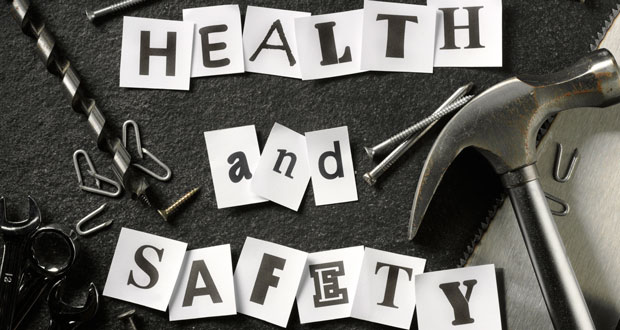The Retained EU Law (Revocation and Reform) Act 2023 has been passed into law with an accompanying schedule listing approximately 600 pieces of legislation that is set to be ‘sunsetted’ by the end of 2023. While health and safety legislation were not among that to be removed, there remains the possibility it could be revoked in the future. Amid this confusing picture, what can be done to continue to ensure good health and safety at work?
 THE INSTITUTION OF OCCUPATIONAL SAFETY AND HEALTH’S VIEW
THE INSTITUTION OF OCCUPATIONAL SAFETY AND HEALTH’S VIEW
RUTH WILKINSON,
HEAD OF POLICY, IOSH
The UK has a very strong track record when it comes to occupational safety and health. This record has been improved over the past 50 years since the implementation of the Health and Safety at Work etc Act 1974 and secondary legislation which followed it.
That is why the Institution of Occupational Safety and Health (IOSH) was hugely concerned by the Retained EU Law (Revocation and Reform) Bill, which threatened to ‘sunset’ EU derived health and safety legislation from 31 December this year.
With other like-minded bodies, we campaigned strongly against this, and we were pleased to see the Government amend the Bill, removing health and safety-related legislation from the list to be revoked.
Now this has become law, however, a threat remains as there is still the possibility that further legislation – including those related to health and safety – could be removed in the future. What then does this mean for businesses and how can they continue to ensure good health and safety at work?
One thing to note is that the actual Health and Safety at Work etc Act was never under threat. It was in fact the regulations that set specific obligations for particular activities which were likely to be impacted, such as the Construction (Design and Management) Regulations 2015 (CDM); the Work at Height Regulations 2005; the Control of Substances Hazardous to Health Regulations 2002; as well as The Management of Health and Safety at Work Regulations 1999.
While the imminent threat to these may have been removed, there is no guarantee they won’t be threatened again in the future. However, what has changed with the Act is that there will be consultation opportunities before any changes are to be made.
For businesses, the key thing to remember is that they must ensure they continue to prioritise their workers, to prevent harm and comply with current legal requirements. Organisations cannot be resilient and sustainable in the current world of work without committing to protecting the safety, health and wellbeing of their most vital resource: their workers.
Consumers, investors, and employees are now more socially aware and expect their health and safety to be protected.
Socially sustainable organisations are those which recognise and prioritise the adoption of a holistic person-centred approach to everything they do. They recognise the value of their workers, treat them as an asset and invest in them. This includes the provision of a safe and healthy working environment, the creation of conditions to promote decent work for their workers which underpins corporate performance and sustainability.
Businesses need to adopt forward-looking, long-term strategies and broader measures of social sustainability and human capital value. They should adopt enhanced disclosure and reporting frameworks, to assess and report on the performance and value of the workforce and seek to achieve better corporate human capital performance.
Occupational safety and health professionals play a crucial role in helping organisations to create reporting and learning cultures in which prevention lessons are learned. They are best placed to work across the business to support social sustainable practices and OSH performance evaluation and reporting.
Businesses need to take this seriously now, or risk falling behind.
 THE BRITISH SAFETY COUNCIL’S VIEW
THE BRITISH SAFETY COUNCIL’S VIEW
PETER MCGETTRICK,
CHAIRMAN OF BRITISH SAFETY COUNCIL
When I last wrote for Facilities Management Journal on the subject of the Retained EU Law (REUL) Bill, back in March, no one could have imagined just how much the Government’s plans would change.
This piece of legislation had been intended to overhaul our entire stock of EU-derived laws still on the UK statute book. That would mean, by the end of this year, all of them would simply disappear, unless individual Ministers decided to keep or amend them.
For many of us, this posed a risk too far – given many of the laws we rely on to protect our health, safety and our environment were among the 4,500 plus that were introduced while we belonged to the EU.
It also meant that other laws could be affected, having had their underpinning legislation removed. And it threatened to open up the equivalent of a legal black hole, in which cases would in future have to be decided by the courts, rather than being defined clearly in regulations.
But, on 10 May, the Business Secretary Kemi Badenoch confirmed to Parliament, following much speculation, that there would be a complete sea change in how the REUL Bill would work. Now, instead of a ‘sunset clause’ threatening all 4,500 laws, a list of around 600 would be the only ones to be revoked or amended this year.
This, the Minister argued, was being done for practical reasons and, while it clearly disappointed some who wanted to finally ‘get Brexit done’, was the only way the Civil Service could realistically deliver it.
But this was only the start of the real work, as the Bill was about to go to the Lords for Report stage and then its 3rd Reading, where many amendments would be proposed to try and put some curbs on the significant power grab that it represented, with little or no Parliamentary safeguards.
Despite a number of very hard-fought and valiant attempts by the Lords, however, each time the Bill was sent back to the House of Commons, all amendments were rejected. Finally, following a series of ‘ping pongs’ between the two houses, the Minister in the Lords, Lord Callanan, gave some reassurances from the dispatch box, which the Lords accepted, and the Bill went to Royal Ascent on 29 June.
The commitments the Government made were that it would “not row back on environmental protections” and any major changes to the levels of environmental protection under the remit of the Bill would be subject to consultation and protection conferred by the Environment Act 2021. It also said that the process of review by special “sifting committees” would ensure that Statutory Instruments will not pass unnoticed where they need wider debate. Whilst the recommendations of the sifting committees are advisory, they are routinely followed. Where there are more significant reforms, the Government will go to public consultation.
Even with these verbal reassurances, and the change of approach by the Government, a number of concerns remain.
The REUL Bill means that many thousands of laws can still be revoked between now and 2026, and the Law Society has called on the Government to “publish an exhaustive list of every piece of legislation being revoked as soon as possible to ensure adequate scrutiny of the affected laws”.
The Bill introduces the concept of ‘total regulatory burden’, which any future changes must not add to – they can only maintain or reduce it, even if they are vital protections we rely on in other ways for our health and safety.
And there is more reform to EU-derived laws to come. We know that the Financial Services and Markets Bill and the Procurement Bill will between them revoke around 500 more pieces of retained EU laws.
So, in many ways, the reforms have only just begun and we will be keeping a careful watch on how they may affect the UK’s excellent reputation for health, safety and wellbeing.





